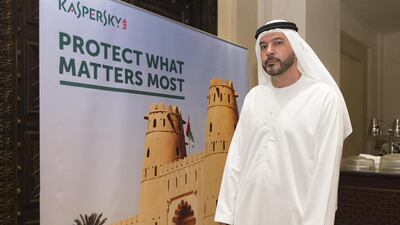DUBAI // You should work as hard to protect your privacy online as you do off-line, internet users were advised on Monday.
As nearly everyone in the UAE has internet access, greater caution is necessary, according to Nasif Kayed, former director of the Sheikh Mohammed Centre for Cultural Understanding.
Privacy has been important to the country culturally and historically, he said at a conference on Monday.
“We are still focused on privacy in our physical life and we are not thinking as much about social media, for instance,” said Mr Kayed, chief executive of the Arab Culturalist. “So we need to take more responsibility to protect the older generation, which is exposed, as well as women and children.”
According to research published last month by Kaspersky Lab, a software security firm, the UAE was among the top three countries targeted for cyber attacks on organisations, behind Spain and Pakistan.
“There is a higher number of attacks happening in the UAE because the internet penetration is higher than other countries,” said Mohammed Hasbini, a senior security researcher at Kaspersky Lab.
“We also see that the regional geopolitical situation encourages more attacks to happen because nations are trying to know what to do next.”
In the second half of this year, 18 per cent of internet users in the UAE, or 1.1 million people, were attacked online, with almost half of the population hit by local threats.
About 83,800 IT devices in the country were found to be infected and launching attacks on other users in the UAE.
“But it is not just limited to us. Yahoo was hit by its worst hack ever, with 500 million accounts swiped last week,” said Mr Hasbini.
“This isn’t an attack that happened last week or last month, it happened three years ago and we just found out as it was just announced a few days ago.”
Kaspersky Lab said 18 per cent of UAE internet users had fallen victim to cybercriminals when they were travelling, and about the same percentage of travellers did not take any steps to protect themselves online.
“If any of our information at the Roads and Transport Authority or Etisalat, for example, is used or affected in any way, it affects our honour, pride and dignity and people’s reputations are on the line,’ said Mr Kayed.
“For some people, invading your privacy could be something you can live with, but here it is not because of our cultural values.”
Aman Manzoor, Kaspersky Lab’s regional sales director, said websites were tracking and anticipating the moves of internet users, adding that 37 per cent of internet users were not aware of the malware on their computers.
Mr Hasbini said: “It’s a serious problem that we definitely need to be aware of and pay attention to.”
cmalek@thenational.ae

